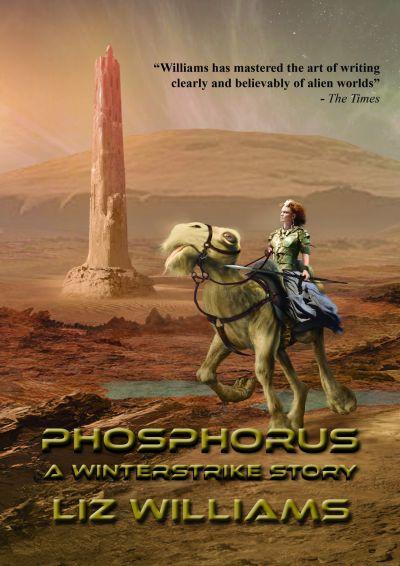Blue in the Night
Phosphorus
By Liz Williams

26 Mar, 2020
2018’s Phosphorus takes place in Liz Williams’ Winterstrike space fantasy setting, as does Banner of Souls.
A terraformed Mars is divided between belligerent sisterhoods. Bombs are falling on young Canteley’s home city of Winterstrike. Canteley’s mother sends Canteley off to live with her aunt Sulie in distant Tharsis.
Was this to protect the girl? Or was it because her prophetic dreams suggest Canteley could be useful to Sulie?
Tharsis is comfortably distant from Winterstrike, distant enough that it hasn’t attracted any other refugees. It is also almost entirely abandoned. Canteley’s arrival doubles the living human population of the city. Assuming, that is, that Canteley is human. The voices that whisper in her dreams say otherwise.
Sulie is an ambitious matriarch who has never let convention or even law interfere with her grand schemes. Canteley guesses that she herself might be a element of one of those schemes, but she cannot imagine what it might be.
Legend has it that the city of Tharsis predates the human settlement on Mars. Those who know their history dismiss this claim. Of course Mars was lifeless before humans terraformed it. Yes, but humans may not have been the only space-going beings to land on the red planet. Tharsis is what is left of a failed alien colony. Sulie believes that she can use the alien legacy to her ends.
Nothing goes as planned.
~oOo~
A plot featuring a naïve young woman who is exiled to a distant, isolated, dilapidated dwelling filled with secrets best forgotten might sound Gothic. Yes, indeed it is. It’s very very Gothic. I am a little surprised that Jim Burns neglected to include a single illuminated window in his otherwise on-point cover.

Humanity is not the only nor the most advanced technological species in this universe, although the degree to with humans are consciously part of the galactic community is open to question. This isn’t a particularly friendly Milky Way. The Solar System’s top predators may be rabbits on the galactic stage.
One of the defining technologies of this setting is the mechanization and control of reproduction, which means that the production of the next generation is done according to perceived need (as judged by those in power).
One of the benefits of this system is that all those cumbersome emotions evoked by sexual reproduction as we know it can be pitched overboard [1]. This permits the people at the top to focus on what really matters: relentless, ruthless competition for power.
Despite this, many of the characters are sympathetic, as is Canteley.
Imagine if you will what John Varley’s Eight Worlds might look like if it had been written by Tanith Lee. I enjoyed the setting and characters, even though I disapproved of its social arrangements.
Phosphorus is available here (Amazon US),here (Amazon US), here (Amazon US), here (Book Depository), and here (Chapters-Indigo).
1: Along with men, who basically don’t exist anymore.
